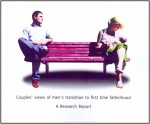 A study by the Nelson-Marlborough Institute of Technology and the Public Health Service has found that new fathers are worried about different things than what their partners think they are worried about!
A study by the Nelson-Marlborough Institute of Technology and the Public Health Service has found that new fathers are worried about different things than what their partners think they are worried about!
The new fathers participating in the study ranked three issues most important of all: the lack of involvement in the transition process to parenthood, a stressed relationship with the partner, and the joys of being a dad.
However, the mothers in the study thought their men are at least just as concerned with money, sex and the gender of the baby – issues that were mentioned in the men’s interviews, but not even ranked as important.
“The data ranked as important by the women (but not by the men) tends to reflect commonly held views about how men respond to fatherhood.” write researchers David Mitchell and Philip Chapman.
“This raises questions about discourse that is dominant, where it originates and whose interests it reflects.”
The researchers acknowledge the limitations of their study, which involved only 11 couples who were interviewed in gender-specific groups before the birth and 6 months after.
The fathers in the study also widely criticised not being involved by midwives, Plunket nurses or other providers and ranked this as one of the top issues.
Father & Child Trust Coordinator Harald Breiding-Buss, who has worked with men in antenatal classes for 9 years, agrees with the findings. “The failure of ‘maternity’ services to address, or even know about, new fathers real concerns is a major contributing factor to relationships making an irreversible turn for the worse around this time”, he says.
“We’re having a 21st century maternity service system based on 1950’s stereotypical beliefs.”
Previous research by the Mitchell/Chapman team had found similar discrepancies between views and needs that men expressed to their interviewers, and perceptions held by maternity health professionals



 A study by the Nelson-Marlborough Institute of Technology and the Public Health Service has found that new fathers are worried about different things than what their partners think they are worried about!
A study by the Nelson-Marlborough Institute of Technology and the Public Health Service has found that new fathers are worried about different things than what their partners think they are worried about! Funding for father services in New Zealand remains marginal after both national and local government funders have declined parting with money for solid project proposals by the Father & Child Trust.
Funding for father services in New Zealand remains marginal after both national and local government funders have declined parting with money for solid project proposals by the Father & Child Trust.  The steady growth of single-parent households that began in the early 80s has turned into a small decline, according to 2006 Census data.
The steady growth of single-parent households that began in the early 80s has turned into a small decline, according to 2006 Census data.
